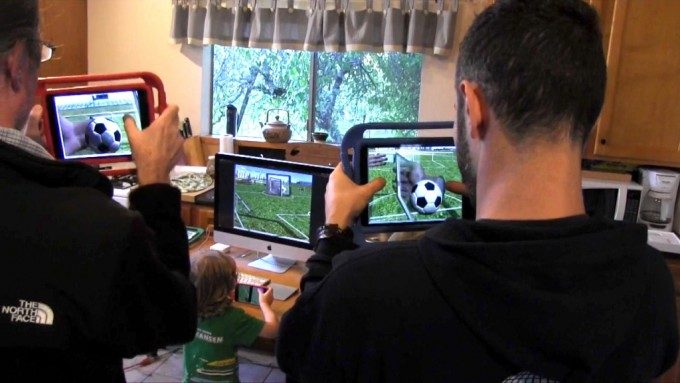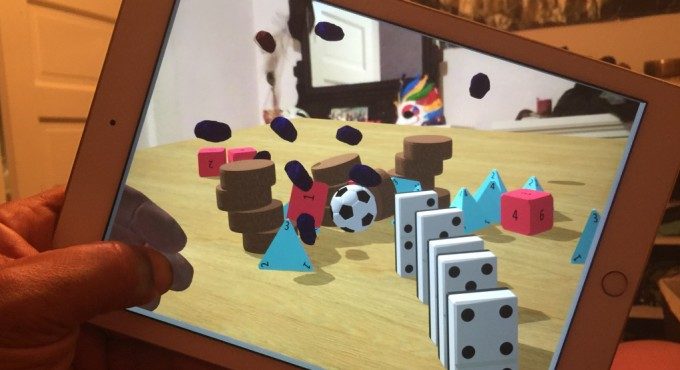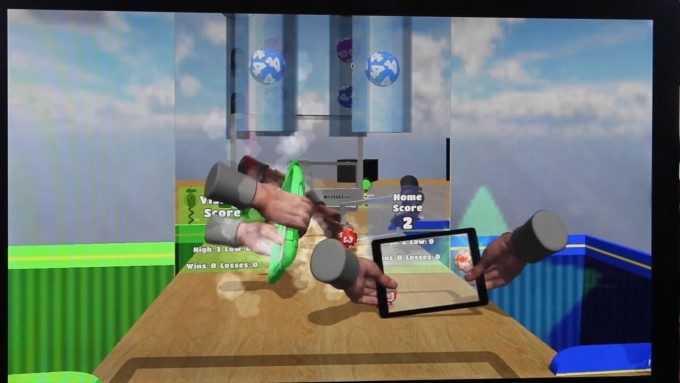Pantomime, the company founded by VPL-alumni David Levitt and Sims-developer Don Hopkins, released its Playground app for iOS today. Pantomime describes the app as a “Consumer Immersive 3D Platform” that does not require a headset—think a radically mobile VR display that can be paddled like a Nintendo Wii controller—but with greater precision.
The app allows users to use their iOS devices as viewers into, and tools to use in, virtual worlds; a video accompanying the press release depicts users deploying their devices to interact with worlds displayed across one or more screens. While social gaming functionality receives the most emphasis, the app is not a game, but “an introduction to a new immersive technology,” according to Pantomime’s press release.
By moving and tapping an iOS device, a user can, for example, knock over or launch objects in the virtual world. The app also allows users to move and manipulate virtual objects via finger gestures, thereby making the app car and subway-friendly. Besides tracking and displaying the iOS device—or devices, depending on how many users and devices are present—itself, the app also tracks and displays hand placement by registering where a users thumbs or fingers are on the iPad, iPhone or iPod.
So, how do Pantomime achieve the level of accuracy and fluidity to present the illusion of peering into virtual worlds? At GDC in March, the company announced it had been granted a patent for its mobile tracking solution, described as a “…support and geometry based method, [that] enables fast, accurate motion tracking with low latencies, high frame rates, no jitter or drift, and no need for a camera or vision processing.” In other words, the company have found a way to compensate for the lack of native 6DoF tracking on mobile devices like iPads, and are using data from on-board sensors to approximate user movement using proprietary processing methods.
Pantomime’s press release for the app launch makes a point to drill home the idea that Pantomime is social, casual and fun in a way that most VR/AR platforms are not—and perhaps will not be for some time. See, for example: “Since the apps use ordinary mobile screens and don’t require a VR headset, Pantomime is the first immersive reality platform accessible to ordinary consumers and mobile game players.” Or simply read the text underneath the “VIRTUAL WORLDS FOR THE REST OF US” subheader:
“The ultimate results of these technical innovations are social. Pantomime’s immersive worlds for consumers challenge the stereotype of cybernauts as isolated, elite geeks in a separate world. Since users don’t put on headsets, they easily see each others’ screens and make eye contact in the real world. Since they can Teleport, they’re not alone in virtual worlds either. And since no one has to buy special hardware, Pantomime isn’t for rich, courageous early adopters – it’s for everyone with a tablet or phone. Virtual Worlds for the Rest of Us.”
In other words, Pantomime wants to take advantage of hardware that is already ubiquitous—smartphones, tablets and similar devices. More to the point, Pantomime wants to access a “casual” gaming and social market; again, think a more precise and accurate Wii controller. Think people who are interested in the possibilities for fun that VR offers but either do not necessarily want to wear a headset (and completely abandon the real world) or do not want to shell out for pricy, unproven hardware. That is, ultimately, what Pantomime is offering: a bridge between the virtual and real worlds that allows you to have fun in both without having to give yourself over entirely to either—and without demanding that potential users purchase not only headsets, but also game consoles or relatively high end PCs.
To strengthen its “social” dimension, Pantomime Playground allows users to “teleport into the same virtual world, see each others’ animated virtual hands and devices, interact, cooperate and compete” via local WiFi networks.
Pantomime assures that “upcoming releases will support Mac, Android, Windows, and other devices” and has revealed, in an email to Road to VR, that it is looking to work with VR headset companies to make it possible for “people with or without an HMD” to “interact together.” If it can meet that goal, Pantomime will have taken another step towards making VR truly mainstream while also seriously expanding the notion of “cross-platform” compatibility.

In fact, the launch edition of Pantomime Playground for iOS includes a beta version of the upcoming Mac OSX app, a link to which you can find in the app description on this page.
Aside from boasting its own world-class social gaming and VR talent, Pantomime is working with VR cinema company Jaunt VR. Pantomime was also among the winners of 2014’s Launch Silicon Valley World Cup Tech Challenge.
Take a look at the app, try it out and let us know what you think in the comments section.








